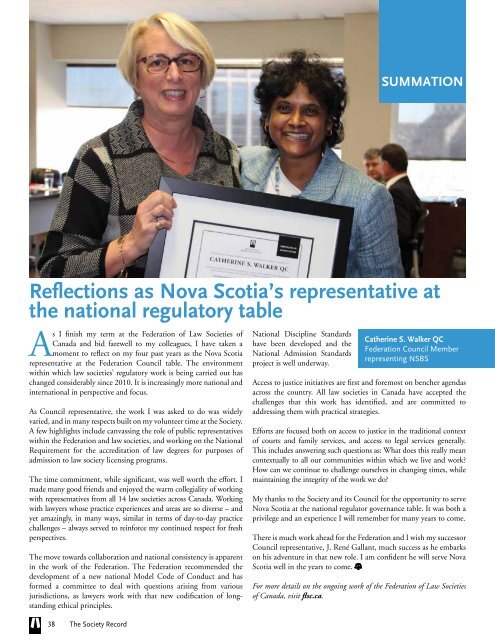11eApYW
11eApYW
11eApYW
Create successful ePaper yourself
Turn your PDF publications into a flip-book with our unique Google optimized e-Paper software.
Summation<br />
Reflections as Nova Scotia’s representative at<br />
the national regulatory table<br />
As I finish my term at the Federation of Law Societies of<br />
Canada and bid farewell to my colleagues, I have taken a<br />
moment to reflect on my four past years as the Nova Scotia<br />
representative at the Federation Council table. The environment<br />
within which law societies’ regulatory work is being carried out has<br />
changed considerably since 2010. It is increasingly more national and<br />
international in perspective and focus.<br />
As Council representative, the work I was asked to do was widely<br />
varied, and in many respects built on my volunteer time at the Society.<br />
A few highlights include canvassing the role of public representatives<br />
within the Federation and law societies, and working on the National<br />
Requirement for the accreditation of law degrees for purposes of<br />
admission to law society licensing programs.<br />
The time commitment, while significant, was well worth the effort. I<br />
made many good friends and enjoyed the warm collegiality of working<br />
with representatives from all 14 law societies across Canada. Working<br />
with lawyers whose practice experiences and areas are so diverse – and<br />
yet amazingly, in many ways, similar in terms of day-to-day practice<br />
challenges – always served to reinforce my continued respect for fresh<br />
perspectives.<br />
The move towards collaboration and national consistency is apparent<br />
in the work of the Federation. The Federation recommended the<br />
development of a new national Model Code of Conduct and has<br />
formed a committee to deal with questions arising from various<br />
jurisdictions, as lawyers work with that new codification of longstanding<br />
ethical principles.<br />
National Discipline Standards<br />
have been developed and the<br />
National Admission Standards<br />
project is well underway.<br />
Catherine S. Walker QC<br />
Federation Council Member<br />
representing NSBS<br />
Access to justice initiatives are first and foremost on bencher agendas<br />
across the country. All law societies in Canada have accepted the<br />
challenges that this work has identified, and are committed to<br />
addressing them with practical strategies.<br />
Efforts are focused both on access to justice in the traditional context<br />
of courts and family services, and access to legal services generally.<br />
This includes answering such questions as: What does this really mean<br />
contextually to all our communities within which we live and work?<br />
How can we continue to challenge ourselves in changing times, while<br />
maintaining the integrity of the work we do?<br />
My thanks to the Society and its Council for the opportunity to serve<br />
Nova Scotia at the national regulator governance table. It was both a<br />
privilege and an experience I will remember for many years to come.<br />
There is much work ahead for the Federation and I wish my successor<br />
Council representative, J. René Gallant, much success as he embarks<br />
on his adventure in that new role. I am confident he will serve Nova<br />
Scotia well in the years to come.<br />
For more details on the ongoing work of the Federation of Law Societies<br />
of Canada, visit flsc.ca.<br />
38<br />
The Society Record


